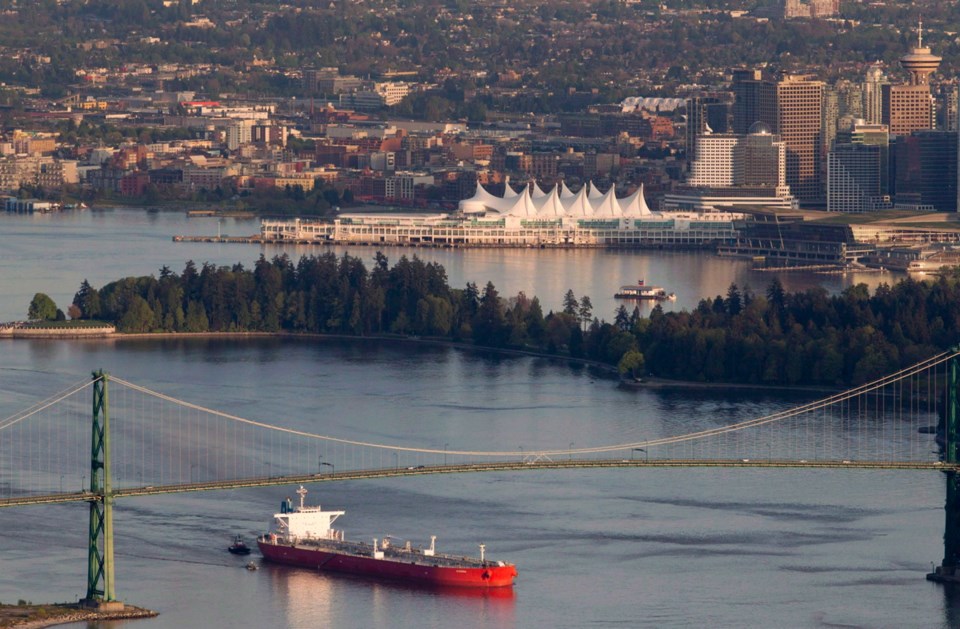Listening to Barack Obama give his State of the Union address, you could just about envision the oil tankers sliding past Victoria.
Or maybe not, depending on who’s reading the tea leaves.
In any case, our neighbours across Juan de Fuca Strait are taking no chances. They’re preparing for an oil spill. Spurred on in part by the Kinder Morgan pipeline proposal, U.S. authorities on the Olympic Peninsula are getting down to the nuts and bolts of what to do if the black goop hits the beach.
For this is what suddenly alarmed Americans are dealing with now that dependable if dull Canada, the Ned Flanders of North America, has suddenly gone Breaking Bad: Ford, Bieber and bitumen, baby — the Canucks have gone rogue.
Sorry, sorry, sorry, that’s going too far. Alas, it’s easy to get swept up in the rhetoric, xenophobia and shrill hyperbole found on either side of the pipelines debate. And it’s not helping.
Pundits this week were anxiously seeking — and not finding — clues from Obama, who must decide what to do with TransCanada Corp.’s contentious plan to build the Keystone XL pipeline, which would carry Alberta oil to Texas.
If Keystone gets rejected, Kinder Morgan’s proposed expansion of its pipeline from Alberta to Burnaby becomes even more important to the Canadian oil industry and Stephen Harper. The Kinder Morgan plan would see tanker traffic through Juan de Fuca Strait go from five ships a month to, depending on the estimate, somewhere between 25 and 34. So, yes, Obama’s decision has local implications.
The pressure on the president is intense. The Canadian government is pushing hard for Keystone. U.S. environmentalists are pushing back. An over-the-top U.S. television spot that aired on MSNBC just before and after the State of the Union called Keystone a “sucker punch to the American heartland,” one that would funnel Asia-bound Canadian oil through a Texas port on behalf of Chinese state-backed oil companies that have invested $30 billion in Alberta’s oil patch. The prime minister’s office, which never met a pipeline opponent it couldn’t demonize (don’t think Harper has Neil Young on his iPod these days), took a shot at the ad’s American billionaire sponsor in replying that it’s the U.S. that stands to benefit the most from Keystone. And back and forth it goes.
Which makes the turn-down-the-volume, practical approach being taken in Washington state refreshing. Government agencies and a non-profit group have skipped the outraged bleating and gone straight to the question of how to respond if a spill occurs.
A series of workshops are being held in six counties bordering salt water, with representatives of the U.S. Coast Guard and the state fish and wildlife, ecology and natural resources departments, among others, on hand to talk about what to do if disaster hits. Saturday’s session was an all-day affair in the Clallam County courthouse in Port Angeles.
“We’re not going to talk about the wisdom of transporting the product,” says Robyn du Pré, executive director of the Northwest Straits Foundation. That’s a political debate that they’ll leave to others. “We’ve been able to have the conversation without getting super-political.”
It’s not just the extra traffic from Kinder Morgan that has inspired the initiative. Even without the added tankers, shipping is growing. Du Pré has been given a sneak peak at a soon-to-be-released report on large vessel traffic in the strait. “It’s going to practically double,” she said.
Remember that the Americans are debating the massive Gateway Pacific coal-shipping terminal proposed for Cherry Point, Wash. It would add hundreds of ships to the roughly 9,000 big vessels transiting Juan de Fuca Strait each year.
Also remember that some of the worst oil spills don’t involve oil tankers. The last bad local one was in 1991, when the Japanese fish processor Tenyo Maru sank after colliding with a Chinese freighter at Swiftsure Bank; one crew member died and fuel oil spread to Oregon. In 1988, thousands of Vancouver Island birds died when a barge dumped 875,000 litres of fuel oil into the chuck off Grey’s Harbor, Wash. Whidbey Island’s shellfish beds were closed after an arsonist torched a derelict fishing vessel in 2012.
So while Canadians yell at each other over the relative risks of shipping oil, the Americans are getting prepared, just in case.



